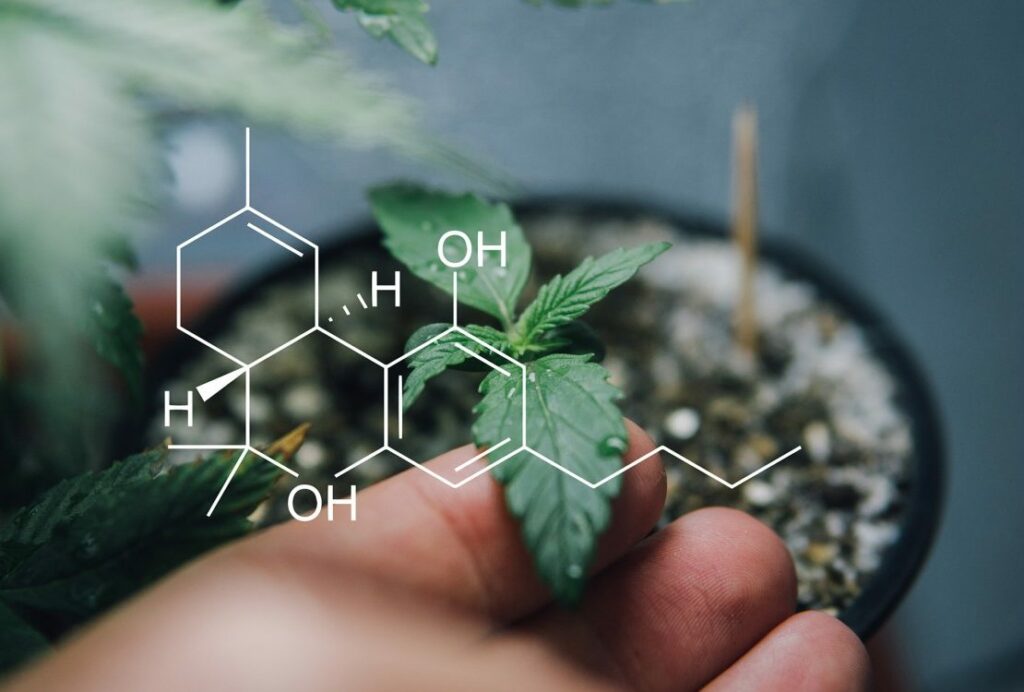
CBD and THC are both cannabinoids found in cannabis, although it’s not commonly known what the differences are between the two. Here at Canavape, we believe that you should understand the substances that you ingest, and how these two naturally-occurring chemicals will affect you differently.
That’s why we’re here to explain the difference between CBD and THC in detail, focusing especially on what these two cannabinoids do to you and how they can be used.
Both CBD and THC are cannabinoids – naturally occurring chemical compounds that are found in the hundreds in cannabis – that act on pre-existing cannabinoid receptors in the body. Interestingly, CBD and THC are made up of the same parts: carbon, hydrogen and oxygen. All that differs between the two is how they’re structured.
The slight difference in the structure of these two different cannabinoids that separates them also accounts for their hugely varying effects on humans.
Because of the variance in their chemical structure, CBD and THC have different effects on the body and mind. THC is the psychoactive compound in cannabis that activates the cannabinoid receptors in our brains. The effects of these receptors being stimulated by increased levels of THC include increased blood flow to the prefrontal cortex and an increased sense of reward. This is what makes users of cannabis feel ‘high’.
CBD doesn’t get you high, but its unique properties are just as interesting as THC’s. When the CBD reaches the cannabinoid receptors in the brain, it actually has the opposite effect to THC – dampening psychoactive activity. It’s because of this psychoactive suppressing quality that CBD can have calming and anti-stress effects, and it’s also thought to have neuroprotective, anti-tumour, and anti-anxiety effects.
Different strains of cannabis have different levels of CBD or THC, meaning that some strains have the potential to make you feel anxious, whilst some have the potential to make you completely calm.
The main active element of recreational cannabis is THC, so the main reason that people use it is for its relaxing or psychoactive effects. Individuals who use cannabis recreationally often report on the substance’s pain relief qualities, and THC is used across the world for its anti-nausea properties.
CBD, however, is building traction as a more legitimate medicinal substance and a range of products are now commercially available including E-liquid, CBD oil, and edibles, meaning the options for CBD consumption are broad. CBD is currently being used in the treatment of illnesses including migraines, nausea, MS, arthritis, and insomnia, among others.
Under UK law, THC is currently illegal in its most popular form: cannabis is a class B drug with up to 5 years in prison as a penalty for possession. Legalisation of the drug for both medicinal and recreational purposes is, however, spreading across the USA, and Canada has recently legalised it. Portugal, the Netherlands and Spain also have a liberal approach to personal use of cannabis.
CBD, on the other hand, is legal and can now be prescribed by doctors under UK law. CBD oil that is produced in the UK must have a maximum THC content of 0.2% to ensure that it is not psychoactive.
Within the confines of UK law, THC remains illicit in its prevalent form: cannabis is categorised as a class B drug, with potential imprisonment of up to five years for possession. However, the global trend towards legalising cannabis for medical and recreational usage is gaining momentum. The USA has embraced this transformation, while Canada recently joined the fold. Similarly, Portugal, the Netherlands, and Spain exhibit a progressive approach to personal cannabis use.
On the other hand, CBD has garnered legal status and can be prescribed by medical professionals in the UK. UK-produced CBD oil is mandated to contain no more than 0.2% THC to ensure its non-psychoactive nature.
In recent years, an encouraging shift has taken place in the UK and the EU regarding medical cannabis. The UK now permits medical cannabis prescriptions for specific conditions, signalling a promising direction towards recognising its therapeutic potential. Likewise, many EU countries, such as Germany, Italy, and the Netherlands, have adopted similar measures, allowing medical cannabis for patients in need.
As the medical and legal landscapes continue to evolve, it’s essential to stay informed about the latest developments and regulations, ensuring responsible and informed decisions.
Please note: This blog post reflects historical data predating recent changes in cannabinoid laws, medical cannabis regulations, and some of our best CBD product names, strengths, and formulations. These historical blogs remain as a reference post our website update, but they might contain outdated information. Discover our updated CBD and legal cannabinoid products for the best CBD experience.